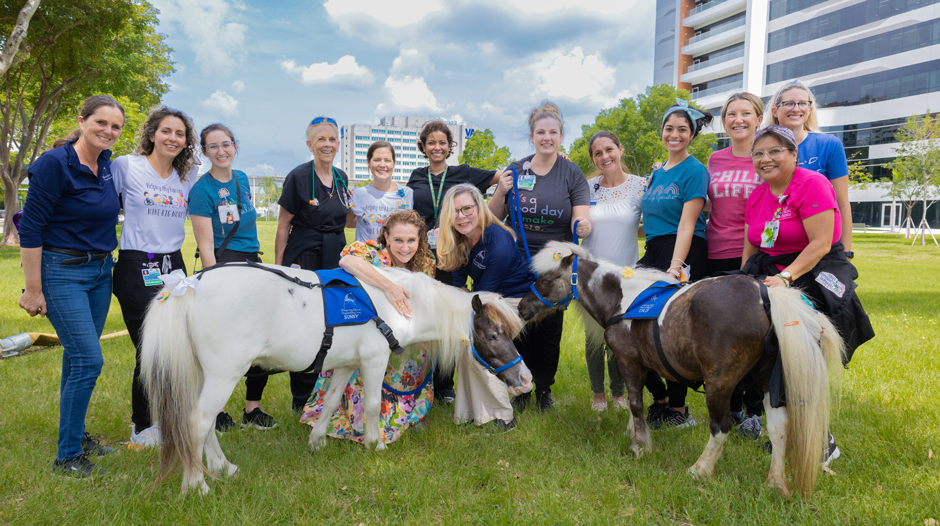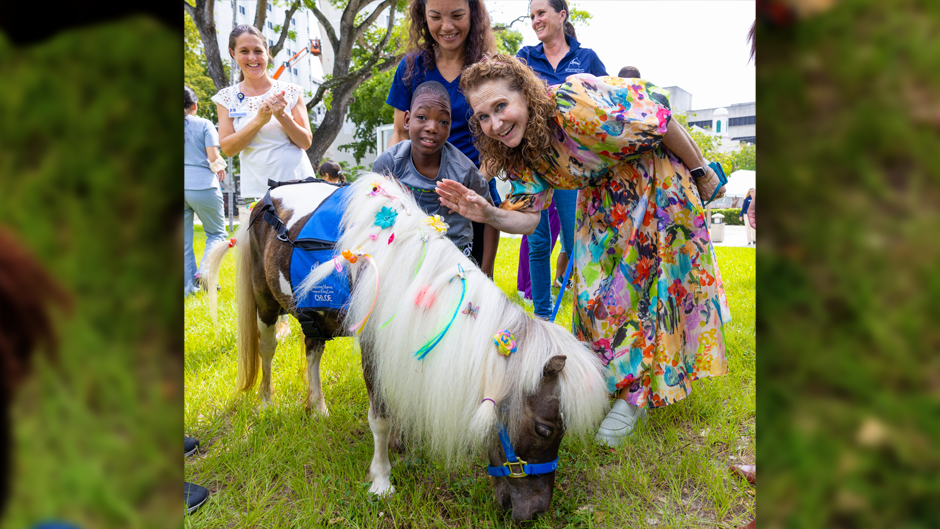At just 9 years old, Juwan Hall already has had brain surgery three times and is still working toward walking without assistance.
Meanwhile, Noah Langlois, 2, has spent most of his short life in hospitals.
But on Friday morning, Juwan, Noah, and about 10 other children, whose conditions benefit from palliative care, got a chance to ease the challenges of their illness and interact with two miniature horses on a grassy patch of land near Holtz Children’s Hospital.
The event was organized with Whispering Manes, a nonprofit that offers therapeutic equine interactions. Their trained staff worked with nurse coordinator Kimberly Juanico, and a team of volunteer UHealth and Miller School of Medicine pediatric specialists who make up the pediatric palliative care team at Holtz Children’s Hospital, which is part of the Jackson Health System.
“All of these children have experienced life altering illnesses, such as organ transplantation or cancer, with extended hospitalizations and the interruption of a normal childhood,” said Dr. Amanda Alladin, assistant professor of clinical pediatrics in the division of pediatric critical care at the Miller School. “We haven’t been able to do things like this in a while because of the COVID-19 pandemic, and it was wonderful to be able to offer these activities to some of our patients again.”
Recently, the team reintroduced ‘‘Feel Good Fridays,’’ where they organize different activities that draw patients outside of their hospital rooms. Last week, a team of City of Miami firefighters brought their truck to visit the children, and this week, they got a chance to pet, brush, ride, and decorate the manes of two miniature horses named Sunny and Chloe.

It is all part of the team’s goal to make palliative care a part of the entire patient experience at Holtz, from the point of diagnosis with a life-limiting illness, to rehabilitation, and outpatient, or end-of-life care. It is also a priority for the entire University, said Felicia Knaul, a professor at the Miller School and director of the Institute for Advanced Study of the Americas, who was co-chair of the Lancet Commission on Global Access to Palliative Care and Pain Relief that was hosted by the University of Miami.
“A child’s journey with serious illness can be very disempowering for them and their families, and palliative care activities like the Whispering Manes program can help empower them and help provide joy and hope,” Knaul said. “The University of Miami should be a leader in pediatric palliative care, offering the full suite of services for all children that need it—throughout their journey with illness and at the end of life, if that is the outcome.”
Dr. G. Patricia Cantwell, a professor of pediatrics and division chief of pediatric critical care medicine, started the palliative care team in 2008. One day, she was doing rounds in the Pediatric Intensive Care Unit at Holtz Children’s Hospital and a nearby patient started squirting her with a water gun.
“It made me recognize that these are kids and we really had to do something to elevate their quality of life, which can be healing,” she said.
Soon after, Cantwell wheeled a bedbound patient, whose health was declining, out of his hospital room for a walk in the fresh air. Not long after they returned, Cantwell moved on to another patient. But soon the nurses alerted her to see that the patient she took outside was dancing in the waiting area. The experience illustrated the power of palliative care, she pointed out.
Since then, Cantwell’s team has grown to include physicians Alladin and Dr. Marta Galarza, assistant professor of clinical pediatrics in neonatal intensive care, along with Kimberly Juanico, the sole full-time pediatric palliative care nurse coordinator at Holtz, and a host of other specialists in child life, social work, child psychology and music therapy.
“Our focus is to make sure that these young patients are comfortable, that they understand their treatment plan, and if they must move toward more end-of-life care, we make sure they are involved in the decision-making process,” noted Juanico.
It was clear that the children and their parents enjoyed meeting the miniature horses on Friday. Juwan said the past two weeks’ activities inspired him to become a firefighter who rides horses. “I love horses,” he said, beaming while brushing the miniature horse.
For 2-year-old Noah, it was the first time he had seen or touched a horse, according to his mother, Michelle Ramkumar Langlois. The toddler kept pointing and waving at the animal when it was time to leave.
“It’s meaningful to be able to do something normal that’s not in a hospital and to experience this with him,” she said. “It’s also really nice to be able to offer him something that does not include fluorescent lights, needles, and lab coats.”

